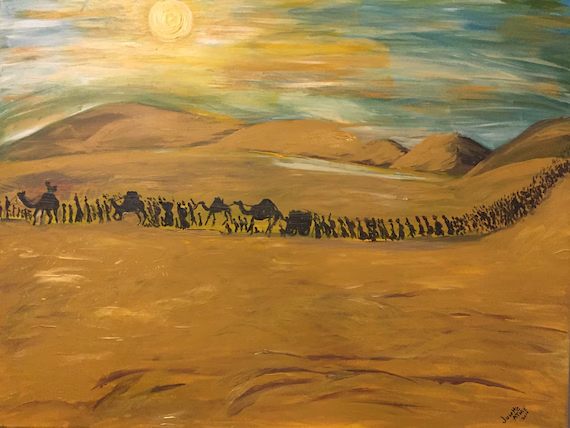Ruth and Naomi
I'll talk to him tomorrow
When they reached Bethlehem, it was harvest time for the barley. Naomi and Ruth were very poor. To get food. Ruth walked out to the fields each morning and picked up the barley the reapers had left behind.
Elimelech lived in the little town of Bethlehem. in Judah, with his wife, Naomi, and his two sons. There had been bad harvests and everyone was growing hungry.
To save his family. Elimelech took them on the long journey across the Jordan River to the country of Moab, where there was plenty of food.
There Elimelech's two sons grew up, and married two girls, named Orpah and Ruth. Then Elimelech died and, later, the two sons also died.
Naomi was left alone with her daughters-in-law. When she heard that the crops were good again in Judah and there was plenty of food, she longed to go back to Bethlehem and be with her own people.
'Let us come with you', said Orpah and Ruth, and together the three women left their homes and began the journey back to Judah. They had not gone far when Naomi stopped and said. 'You should stay here in your own country and find new husbands.'
The two girls didn't want Naomi to go on her own, but she insisted. At last. Orpah agreed to stay in Moab and she kissed Naomi goodbye.
Ruth begged Naomi, 'Please don't make me leave you'. I'll go anywhere with you. Your people shall be my people, and your God shall be my God.
So Orpah returned to her home, and Naomi and Ruth journeyed on to Bethlehem.
When they reached Bethlehem, it was harvest time for the barley. Naomi and Ruth were very poor. To get food. Ruth walked out to the fields each morning and picked up the barley the reapers had left behind. She ground it into flour to make bread. She didn't know that the fields belonged to Naomi's rich relation. Boaz.
Boaz saw Ruth in the fields. 'Who is that woman? he asked the reapers. 'She came with Naomi from Moab.' they said. 'When Boaz heard how kind Ruth had been to Naomi, he told her she would be safe in his fields, and that she could drink all the water she wanted from his reapers' water jugs.
She also knew that at night Boaz slept near his fields to guard his barley crop from thieves. 'After Boaz has had his supper and is asleep, go in quietly, and lie down at his feet'. Naomi said to Ruth.
Ruth did as her mother-in-law told her. When she crept in. Boaz heard her. It's Ruth. I've come for your protection, answered Ruth.
'There is a man, a close relative of Naomi's, who should look after you and marry you. I'll talk to him tomorrow," said Boaz. Boaz talked to the man but the man already had a wife and family and didn't want to marry Ruth.
So Boaz married Ruth, and later they had a son. Naomi was delighted, and very happy that God had given her a grandson.













Comments
Post a Comment